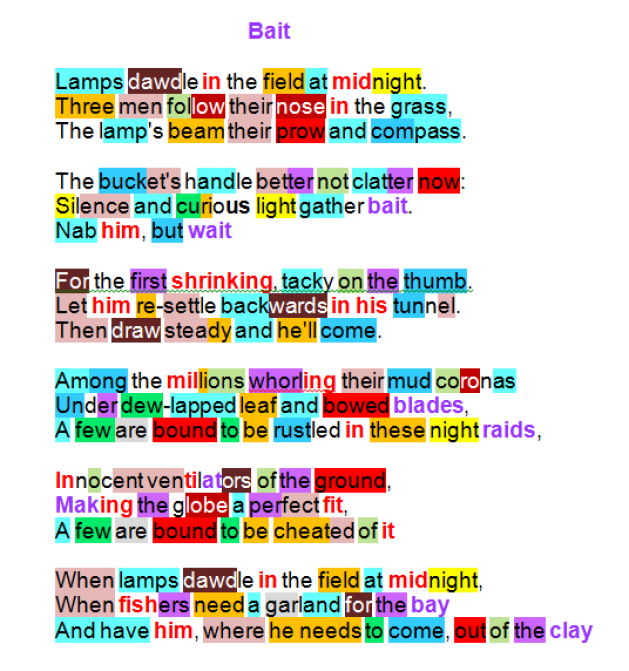A momentary lightening of mood as a burlesque drama unfolds – three poachers are heading for eel habitat … unhurriedly (lamps dawdle), operating at an ungodly hour (midnight) on a familiar path (follow their nose), led by the sharp-angled light beam (prow) that shows them the way (compass).
Remain incognito … Index finger pressed against lips (silence) … extreme care that the equipment in hand (bucket) does not give them away (better not clatter) … use the subdued light ideal for digging worms (gather bait).
Then to business … tricks of the trade passed on to a new recruit: strike quickly (nab him) then relax (wait) … let the creature pull against the pressure (first shrinking) … you will know it is eel (tacky on the thumb) … let it retreat (re-settle backwards) into its crevice then a sustained tug (draw steady) and the eel will not resist (he’ll come).
Tonight eels are running and gyrating in huge numbers (millions whorling), bodies silhouetted by poaching lamp reflections in the murk (mud coronas) beneath the chill riverside damp (dew-lapped leaf) and trodden grass (bowed blades).
Discussion ensues back in the public bar where, shrugging his cocky shoulders, poacher shares his reasoning – stealing eels is an inevitability hereabouts (bound to be rustled) by underground guerrillas like us (night raids); the remonstrating voices (of ecologist or poet) that speak up for a guiltless creature (innocent) that pumps life into the environment (ventilators of the ground) and enhances eco-systems (globe a perfect fit) cut absolutely no ice with poacher’s thinking (a few are bound to be cheated of it).
One pretext for what they do in open secret (lamps dawdle in the field at midnight) is the search for something good to eat – a dish where eel is the star ingredient (garland) baked with subtly bitter flavouring (bay). Heaney ingeniously brings it all together – poaching, prey and cuisine, river bank and ovenware (out of the clay).
- dawdle: dally, linger, take one’s time;
- follow one’s nose: go straight ahead; follow one’s usual pattern;
- beam: ray, shaft of light shed by a torch;
- prow: pointed front end (of a boat);
- clatter: rattle;
- gather: collect;
- bait: food with which to entice fish often no more than the common garden worm;
- nab: catch, capture;
- shrinking: backward move, contraction;
- tacky: sticky;
- whorl: twist, spiral, loop;
- corona: encircling glow;
- dew-lapped: splashed with tiny drops of condensed water vapour;
- bowed: flattened;
- blade: individual piece of grass;
- rustle: steal, remove illegally;
- ventilate: aerate, purify;
- globe: spherical mass;
- garland/bay: elusive; culinary allusion perhaps – baked eel is delicious interspersed with bay leaves; a garland enhances, decorates; bay adds flavouring;
- MP83 After the huge distances and timelessness of’ Beyond Sargasso’,’ Bait’ sees the scale and focus shrink to take in three midnight fishermen. in one of Heaney’s most fanciful images, he compares these men to rustlers, though there seems little connection between the ‘night raids’ on cattle convoys and their groping amid the ‘mud coronas’. Like Esau, the worms are ‘cheated’ of their birth-right by the predatory humans, who too easily forget that they too come ‘out of the clay’.
- 6 triplets (T) in 7 sentences(S) (including a colon); very variable line length 4-12 syllables;
- Heaney experiments with rhyme pattern – Uaa Vbb cWc Xdd Yee Zff;
- the balance between punctuation and enjambed lines is commensurate; the combination of punctuation and enjambment dictates flow and rhythm within the oral delivery potential, governing pace or pause;
- T1 provides a semi-humorous setting; poet as observer; door into the dark ‘midnight’; brazen unhurriedness ‘dawdle’; contrast light and dark; navigational imagery ‘prow’ ‘compass’; present tense; transferred epithet … lamps do not dawdle, men do;
- T2 shhh pantomime like exaggeration; contrast sound and silence;
- T3 eel catching lesson involves a series of imperatives and short sentences; the male of the species ‘him’ ‘he’; eel viscosity will recur as an identifying mark; Heaney betrays personal if limited experience;
- T4 introduces the shrug of ‘plenty-left-for-the-rightful-owners’ that a poacher would employ if challenged; contrast ‘millions’ ‘a few’; militaristic self-aggrandizement‘rustles’ ‘raids’;
- T5 defence of ecological balance is suddenly poet-speak with images beyond the fishermen’s mental interest; the bottom line repeats the facts ‘cheated’; repetition of ‘a few’ amongst huge numbers;
- T6 is more elusive in its meaning – the near repetition of line 1 suggests a motive for poaching as the acquisition of a culinary delicacy and the way of preparing it – Human Chain’s ‘Eelworks’ contains a sensual, intimate account of Heaney’s preparations for baking eel;

